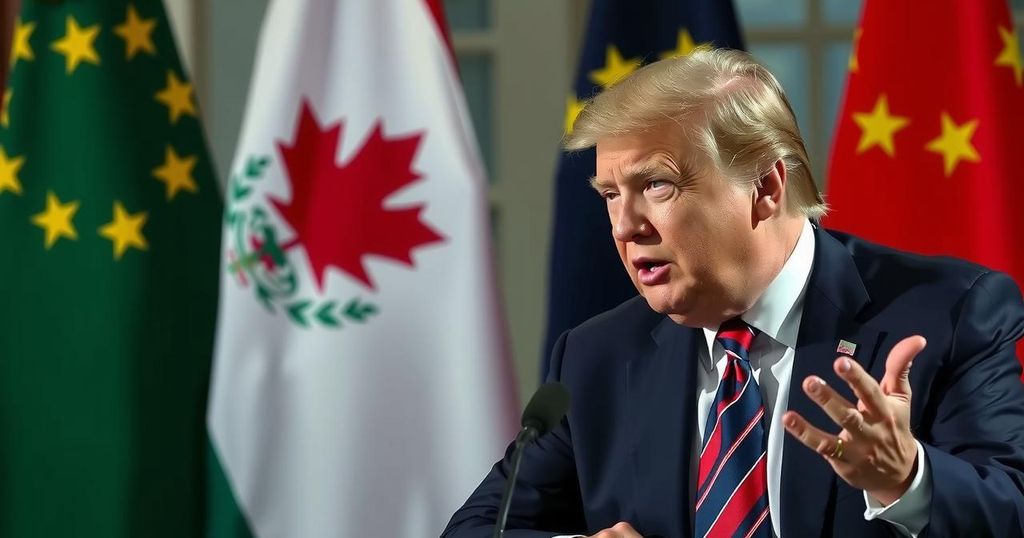World news
AMERICA, ASIA, ASSOCIATED PRESS, BIDEN ADMINISTRATION, CANADA, CHINA, DONALD TRUMP, ENFORCEMENT AGENCY, MEXICO, NATIONAL SECURITY, NEWSWEEK, NORTH AMERICA, PHILIPPINES, POLITICS, REUTERS, TRADE RELATIONS, TRUMP, TRUMP ADMINISTRATION, TRUTH SOCIAL, U. S, U. S. CENSUS BUREAU, U. S. DRUG ENFORCEMENT AGENCY, UNITED STATES, UNITED STATES OF AMERICA, WHITE HOUSE
Sofia Rodriguez
0 Comments
Trump Proposes Increased Tariffs on China, Canada, and Mexico to Combat Drug Importation
President-elect Donald Trump plans to impose a 10 percent tariff on Chinese products and 25 percent on those from Canada and Mexico to combat drug trafficking and illegal immigration, particularly focusing on fentanyl issues.
President-elect Donald Trump has announced a series of proposed tariffs aimed at addressing what he describes as an influx of illegal drugs and immigration from China, Canada, and Mexico. He indicated the introduction of an additional 10 percent tariff on Chinese products and a substantial 25 percent tariff on goods from Canada and Mexico. Trump emphasized the urgency of these measures due to the problematic flow of fentanyl, a potent drug widely trafficked from these nations into the United States.
In a post on his social media platform, Truth Social, Trump stated that discussions with Chinese representatives regarding the trafficking of fentanyl had not yielded satisfactory results, leading him to pursue these tariffs. He lamented that despite promises from China to enforce stringent penalties against drug trafficking, the issue continues unabated, stating, “…drugs are pouring into our Country…”
Furthermore, Trump expressed discontent over immigration issues, asserting that thousands of individuals are crossing at the southern border, exacerbating crime and drug problems. He proclaimed that he would sign an executive order on his first day in office to implement the tariffs, which he will maintain until measures to combat drug trafficking and illegal immigration are successful.
Data from the U.S. Drug Enforcement Agency underscores that both China and Mexico are significant contributors to the fentanyl epidemic in the United States. Trump’s move of imposing tariffs aligns with his campaign promise to take strong actions against these nations for their roles in the drug crisis. During his campaign for the 2024 election, he previously suggested a 60 percent blanket tariff on Chinese goods and reiterated intentions to target Mexico with similar tariffs in the context of immigration policy.
The U.S. Census Bureau reported that in 2020, the nation imported approximately $4 trillion in goods, with China making up $433 billion of that total. In reaction to Trump’s announcement, billionaire investor Bill Ackman noted that these tariffs could serve as a strategic tool for modifying foreign policy, stating that Trump appears to utilize tariffs for achieving both economic and political agendas consistent with his ‘America First’ policy.
As these developments unfold, the implications for international trade and relations with Canada and Mexico remain to be seen, particularly as Trump prepares to take office and implement his plans.
The proposed tariffs by President-elect Donald Trump stem from ongoing concerns regarding the trafficking of illicit drugs and unauthorized immigration from China, Canada, and Mexico into the United States. As part of his broader ‘America First’ policy, Trump aims to address these issues through economic measures such as tariffs. The situation is compounded by the significant amounts of fentanyl, a highly addictive substance, that is being smuggled into the U.S. from these countries, leading to increased calls for action and policy reform. Understanding the economic and social dynamics behind these tariffs is crucial as Trump prepares to take office and seeks to implement his agenda amidst rising tensions surrounding international trade and drug trafficking.
In summary, President-elect Donald Trump’s proposed implementation of tariffs against China, Canada, and Mexico highlights his administration’s focus on combating drug trafficking and illegal immigration. The 10 percent tariff on Chinese goods and the proposed 25 percent tariff on goods from Canada and Mexico are intended as measures to alter the practices of these nations regarding drug enforcement and border control. As Trump prepares to assume office, the efficacy and repercussions of these tariffs will be closely monitored within the broader context of U.S. foreign policy and international trade.
Original Source: www.newsweek.com




Post Comment